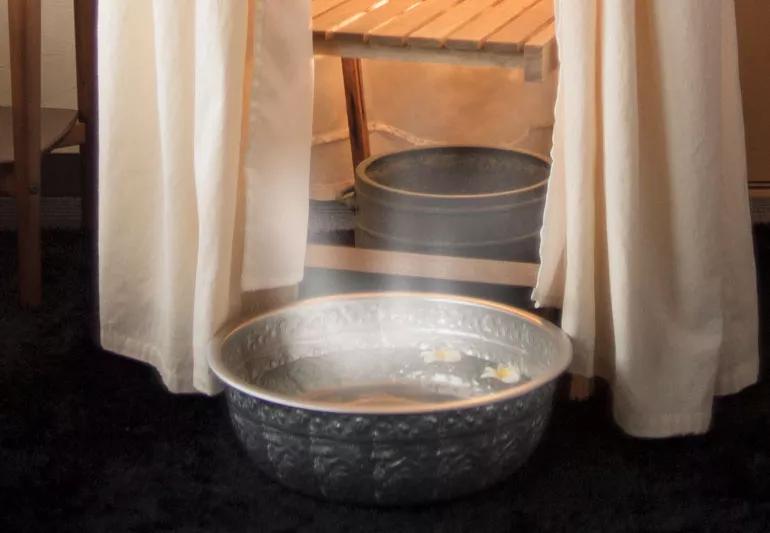This hot seat might be too hot to try

Image content: This image is available to view online.
View image online (https://assets.clevelandclinic.org/transform/e7422e3d-ffa6-4d60-a253-60b19f53a2c9/steamVaginal-545983791-770x533-1_jpg)
herbal bowl steaming vaginal steaming
From candles that smell like them to mystical eggs that are supposed to heal them, vaginas are always a hot topic. People are constantly trying to find new ways to enhance or spruce up their “whispering eyes.”
Advertisement
Cleveland Clinic is a non-profit academic medical center. Advertising on our site helps support our mission. We do not endorse non-Cleveland Clinic products or services. Policy
Recently, vaginal steaming has entered the chat. But this practice isn’t new. Vaginal steaming has been around for centuries, and some say it can help increase energy, reduce stress and balance hormones. So, the million-dollar question is, should you steam your vagina? Ob/Gyn Talia Crawford, MD, weighs in on if this hot seat is right for you.
“Also known as ‘V-steaming’ or ‘yoni steaming,’ vaginal steaming involves squatting or sitting over a pot of hot, steaming water that is infused with herbs,” explains Dr. Crawford. “A blanket is often wrapped around the lower body to prevent the steam from escaping.”
While this practice is newer to the West, vaginal steam detoxing has been linked to an ancient Greek treatment known as “fumigation.” This method involved sitting over a sealed jar of herbs that was heated up in a hole in the ground. A reed was used to transfer smoke from the jar into the vagina. Ancient Greeks believed that the uterus wandered around the body looking for moisture. Fumigation was done to keep it in place. Why? Because a traveling, thirsty uterus was thought to be the source of conditions like infertility and conversion disorder (formerly called hysteria).
In 2012, the World Health Organization (WHO) released a multi-country study that took a closer look at vaginal practices in Indonesia, Mozambique, South Africa and Thailand. The study revealed that vaginal steaming, or smoking, was practiced by some women as a way of maintaining wellness and their identity. Other women did it for a short time after childbirth. Other reasons for steaming the vagina included vaginal tightening or as an overall beauty treatment.
Advertisement
Some say that vaginal steaming can lead to:
However, Dr. Crawford says there’s no scientific evidence that supports these claims. Another thing to keep in mind — the steam only reaches the outer part of your vagina. The steam doesn’t enter your cervix and uterus.
“Certain medications are well absorbed vaginally. On the other hand, there is no proven health benefit for any of the herbal products used in vaginal steaming. Also, it is unknown if an adequate amount of the herbs’ chemical properties are absorbed through vaginal tissue to reach the bloodstream,” says Dr. Crawford.
Dr. Crawford advises that vaginal steaming has the potential to be dangerous. This is because the skin of your vulva is very delicate and could sustain burns. She also says exposing your vagina to steam and scented herbs could alter its pH and cause bacterial vaginosis and yeast infections.
“The vagina is a self-cleansing organ, so the use of steaming, douching or other cleansing agents is not necessary or recommended as it disrupts the natural bacterial balance,” cautions Dr. Crawford.
The equipment used could cause problems as well.
“Additionally, vaginal steaming seats or other equipment may introduce harmful bacteria that could result in a vaginal infection if it has not been properly cleaned,” she says.
And if you’re pregnant, Dr. Crawford says to pass on this practice because excess heat can cause complications or even birth defects.
Not really. Outside of pain relief after vaginal trauma or childbirth, Dr. Crawford says there aren’t any known benefits to soaking in the tub. However, if you’re a fan of baths, avoid using scented products since they can disrupt the normal bacterial balance. And scrub-a-dub-dub that tub regularly. Because if your tub hasn’t been cleaned well, bacteria in it could cause problems down below.
“In order for the vagina to stay healthy, it must maintain a balance of good and bad bacteria,” advises Dr. Crawford. “For this reason, cleaning it with soap, douching or introducing scented products is not recommended. Just use water.”
If you’re experiencing vaginal pain, discharge, odor or dryness, talk to your healthcare provider as there may be an underlying problem that needs to be treated.
Advertisement

Delivered every Tuesday!
Sign up for our Health Essentials emails for expert guidance on nutrition, fitness, sleep, skin care and more
It's a letter about the news!
Learn more about our editorial process.
Advertisement
If you have a vagina, bubble baths aren’t a good idea at any age
Maintain a healthy vaginal microbiota with the help of good bacteria
Vaginal pain can be caused by infections, cysts or other conditions
Bleeding is a risk and warrants taking care, but the reward of this lifesaving medication is great
Severe and debilitating headaches can affect the quality of your child’s life
Type 2 diabetes isn’t inevitable with these dietary changes
Applying a hot or cold compress can help with pain
Pump up your iron intake with foods like tuna, tofu and turkey